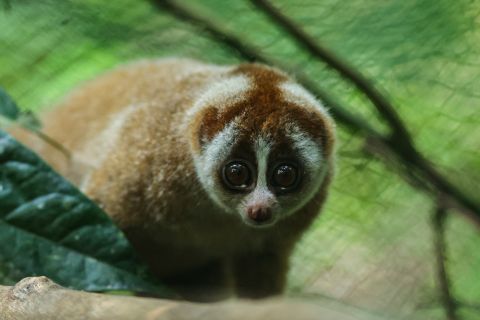
Fourteen endangered slow lorises have been released in the Bukit Barisan Selatan National Park in Lampung, Sumatra. The release operation was conducted by the West Java Forestry Department (BBKSDA Jawa Barat), the Head Office of Bukit Barisan Selatan National Park (Balai Besar TNBBS), Bengkulu Forestry Department (BKSDA Bengkulu) and IAR Indonesia.
The primates had all been surrendered by members of the community to a number of offices of the Forestry Department in West Java and Jakarta. They have since been in the care of the Primate Rehabilitation Centre managed by the West Java BBKSDA in collaboration with IAR Indonesia, at the foot of Mount Salak, in Bogor, West Java.
Before they could be released, the five males and nine females had undergone a recovery and treatment process at the rehabilitation centre to re-stimulate their natural behaviour. The lengthy process started with a quarantine period and medical examination and continued with intensive behavioural observation until the lorises were considered ready for release. They were only deemed suitable once they were displaying all the natural behaviour that will ensure they can survive and breed in their natural habitat.
Before being completely set free, first the lorises are given time to adjust to their new habitat. They are released into a habituation enclosure in which various types of trees are growing that provide them with natural shade and food. During this habituation period, the team in the field continues to observe them and record their behaviour every night. If, during the habituation period, all the lorises are active and there is no abnormal behaviour, then they will finally be released once and for all.
In addition to providing a second opportunity for the Sumatran slow lorises, this release also forms part of efforts to support the sustainability of ecological processes in conservation areas. It is also intended to maintain and increase the population of primate species as endemic animals.
Acting Head of TNBBS Ismanto, S.Hut., M.P. said that the slow loris is a primate protected by Law No. 5 of 1990 and Regulation of the Minister of Environment and Forestry of the Republic of Indonesia Number P.106/MENLHK/SETJEN/KUM.1/12/2018 concerning Plant and Protected Species. Slow lorises are on the list of the 25 most endangered primates in the world and are also protected by international regulations on Appendix I of the Convention on International Trade in Endangered Species (CITES) which means all international trade in slow lorises is prohibited.
He also urged the public not to hunt and/or keep slow lorises in captivity because wildlife fares better in the wild and also supports wildlife conservation programmes in TNBBS.
The Head of North Kotaagung Forest Management Unit, Didik Purwanto, S.Hut, representing the Head of the Lampung Province Forestry Service, echoed the same sentiment. “Thank you to the West Java KSDA Centre and IAR Indonesia who jointly carried out the slow loris release operation. We hope that these protected animals can reproduce normally and sustainably in their habitats. We also urge the public not to hunt them and ask the public to hand over protected animals to KSDA officers if they are still keeping them,” said Didik.
Release procedures in response to Covid-19:
- Current procedures for release operations have been adjusted in response to the pandemic situation. Covid-19 tests are carried out on lorises and on release personnel; masks are worn; contact with the animals is reduced and the number of people directly involved in the field has been reduced. The Covid-19 test carried out on the lorises is a swab-test to ensure that all of them are free from the risk of transmitting Covid-19 to wild loris populations.
- During the pandemic, the health and safety protocols for release operations were improved to minimise the risk of disease transmission. A swab-test was carried out in the laboratory facility on all the animals and the results were all negative. And, from the human perspective, attention was given to the proper implementation of protocols such as physical distancing and mask wearing.
All adjustments in the release procedure were made in an effort to eliminate the potential for transmission of Covid-19 and other zoonotic infectious diseases. This has meant that the release and other conservation activities can still run even in the midst of the COVID-19 pandemic

